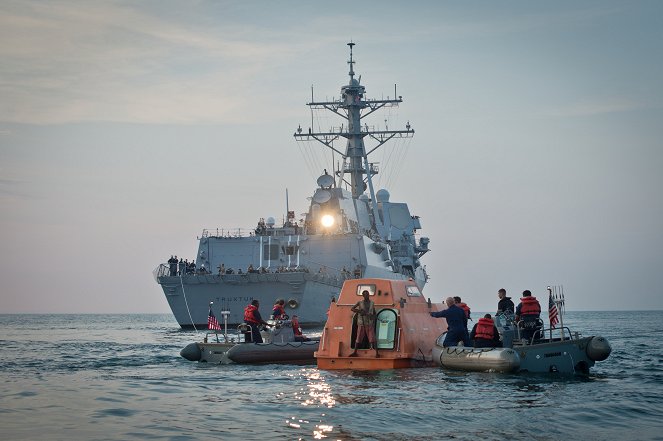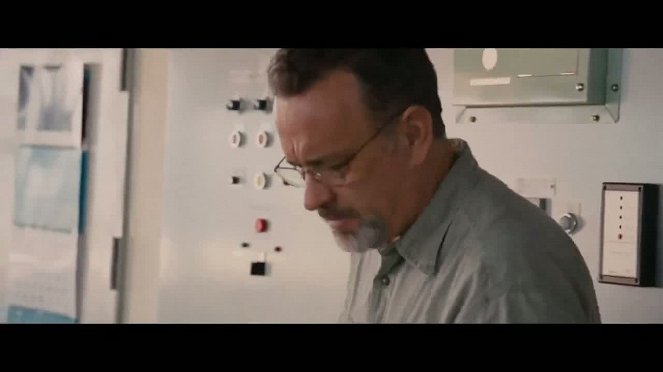Directed by:
Paul GreengrassScreenplay:
Billy RayCinematography:
Barry AckroydComposer:
Henry JackmanCast:
Tom Hanks, Catherine Keener, Barkhad Abdi, Barkhad Abdirahman, Faysal Ahmed, Mahat M. Ali, Michael Chernus, David Warshofsky, Corey Johnson, Chris Mulkey (more)VOD (1)
Plots(1)
Captain Phillips is director Paul Greengrass's multi-layered examination of the 2009 hijacking of the U.S. container ship Maersk Alabama by a crew of Somali pirates. It is – through Greengrass's distinctive lens – simultaneously a pulse-pounding thriller and a complex portrait of the myriad effects of globalization. The film focuses on the relationship between the Alabama's commanding officer, Captain Richard Phillips (Tom Hanks), and his Somali counterpart, Muse (Barkhad Abdi). Set on an incontrovertible collision course off the coast of Somalia, both men will find themselves paying the human toll for economic forces outside of their control. (official distributor synopsis)
(more)Videos (7)
Reviews (15)
Paul Greengrass today has no competition in this type of intimate action movies based on real events. This one is incredibly tense and with a frantic pace (thanks to the camera and the editing), even in those scenes where basically nothing is happening and the characters are just talking (which is most of the film, really). And the emotional climax will give you the final KO. No doubt, one of the best films of the year.
()
Paul Greengrass simply knows how to push my buttons. He can make an absolutely awesome thriller on a contemporary theme in a way that makes me feel that I’m the one standing behind the camera instead of him. I mean normally I can’t stand a shaky camera, but he can employ such great editing that moves the whole thing to such levels of perfection that I can accept it without any problem whatsoever. I have accepted it so many times in the past and I accept it now too. And that’s not to mention the fact that the actors deliver some extra-ordinary performances. That includes Tom Hanks and the Somali pirates, who are simply on fire. I would never have thought that such a trivial idea could be squeezed into almost 140 minutes while making sure that not a single minute of it would be boring. And the rescue mission at the end? That was simply a pleasure to behold. A well-deserved five-star rating. It sure doesn’t happen every day that you’d watch a movie while bating your breath for more than two hours.
()
If you are afraid that Greengrass' shaky camera and grainy image will be missing, be calm, it's here again and there's plenty of it. Moreover, no one can do an ad for the US Navy as sophisticatedly and inconspicuously as him. And Tom Hanks is also excellent. It doesn't have the momentum of United 93 (greater fatefulness) or the Bourne films (a more attractive, action-packed theme), but it's still an original film, full of gripping moments and excellently acted scenes.
()
It’s hard to praise this type of movie better than saying that the creators make it hard for the viewer even to catch their breath for all the suspense here. Despite the fact that they already know not only the result, but (probably) even how the action is going to pan out. The whole thing is underpinned by an unusually powerful final scene in the treatment room which is deserving of all the actors awards in existence.
()
Is Captain Phillips a glorification of the status quo and a civilian hero? I don’t think so. A comparison with Lindholm's A Hijacking is entirely relevant, but we should not automatically claim that the Danish "harder, colder, and non-hero" interpretation of reality is "better". A material comparison of starting points is interesting: The Danes choose a typical situation, whilst the Americans a dramatic and spiraling situation. The protagonist of A Hijacking is an ordinary sailor who is a passive "commodity" in negotiations, the hero of Greengrass's film is already picked up and belongs to the active movers (he is a captain and actively fights for his life almost to the last moment). The American version is actually two-thirds characterized by shifts, actions and reversals, while the Danish version completely avoids them and captures the routine of negotiations that drag on callously. The Danes film in the affected area and let the whole crew live in uncertainty (because they also want to transfer the rawness to the film), whereas the Americans use the calm waters around Malta. These are two approaches to the same topic, I see no reason to hierarchize them - both are completely legitimate. In addition, they both create a very similar picture: a broken individual and a system that continues to function as if nothing had happened. We can certainly perceive Captain Phillips as a celebration of the Navy Seals and the US Army, but Greengrass gives enough clues to the counter-interpretation - the whole situation is absurd, disproportionate and unsolvable (a small orange boat vs. three warships), and both sides happen to have legitimacy. The fact that he is monitoring Phillips and his future captor in parallel should alert us that Greengrass wants to do more than just paint a thrilling case. Similarly to Zero Dark Thirty, here, it is as if more clues seem to tempt to the conventional satisfaction that the disgusting skinny people will get their assess kicked, yet the action only provides spectator satisfaction to a limited extent. There is a disturbing array of free motifs that Greengrass surrounds with his millimeter-accurate direction. My view is more in line with Lindholm's, but that doesn't mean Captain Phillips didn't get to me in the end. It only happened during the penultimate scene, but it was worth the wait. [80%]
()
Gallery (104)
Photo © Sony Pictures / Jasin Boland



Ads